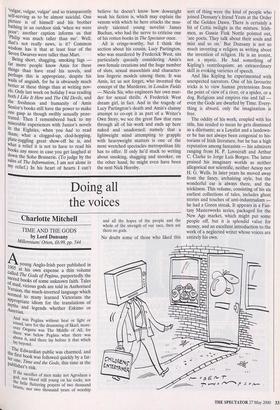Doing all
the voices
Charlotte Mitchell
young Anglo-Irish peer published in 05 at his own expense a thin volume called The Gods of Pegana, purportedly the sacred books of some unknown faith. Tales of mad, vicious gods are told in Authorised Version, the much-inverted language which seemed to many learned Victorians the appropriate idiom for the translations of Myths and legends whether Eskimo or Assyrian.
And was Pegana without heat or light or sound, save for the drumming of Skarl, more- over
Oegana was The Middle of All, for there was below Pegana what there was above it and there lay before it that which lay beyond.
,. The Edwardian public was charmed, and the first book was followed quickly by a fat- ter One, Time and the Gods, this time at the Publisher's risk.
If the sacrifice of men make not Agrodaun a god, nor blood still young on his rocks, nor the little fluttering prayers of two thousand hearts, nor two thousand years of worship and all the hopes of the people and the whole of the strength of our race, then are there no gods.
No doubt some of those who liked this sort of thing were the kind of people who joined Dunsany's friend Yeats at the Order of the Golden Dawn. There is certainly a bit of Celtic twilight in the mixture. Irish- men, as Gussie Fink Nottle pointed out, `are poets. They talk about their souls and mist and so on.' But Dunsany is not so much inventing a religion as writing about the invention of religion. He is an ironist, not a mystic. He had something of Kipling's ventriloquism: an extraordinary skill in evoking varieties of speech.
And like Kipling he experimented with unexpected narrators. One of his favourite tricks is to view human pretensions from the point of view of a river, or a spider, or a dog. Religions and empires rise and fall even the Gods are dwarfed by Time. Every- thing is absurd, only the imagination is free.
The oddity of his work, coupled with his title, has tended to mean he gets dismissed as a dilettante; as a Loyalist and a landown- er he has not always been congenial to his- torians of Irish literature, but he has a high reputation among fantasists — his admirers ranging from H. P. Lovecraft and Arthur C. Clarke to Jorge Luis Borges. The latter praised his imaginary worlds as neither allegorical nor scientific, neither Aesop nor H. G. Wells. In later years he moved away from the fancy, archaising style, but the wonderful ear is always there, and the trickiness. This volume, consisting of his six earliest collections of tales, includes ghost stories and touches of anti-industrialism he had a Green streak. It appears in a Fan- tasy Masterworks series, packaged for the New Age market, which might put some people off, but it is splendid value for money, and an excellent introduction to the work of a neglected writer whose voices are entirely his own.


































































 Previous page
Previous page